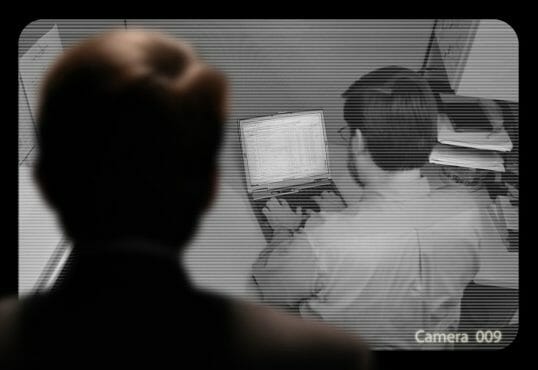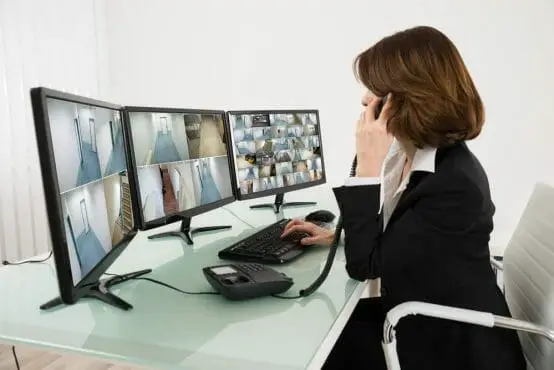The simple answer to the question, can an employer record audio in the workplace, is not cut and dry. But people need to know their rights to being recorded and recorded in a place they go to nearly every day — work.
Recording audio conversations becomes complicated because of the different state-by-state rules and regulations. The difference in laws creates the need to pinpoint each state’s mandates and how they affect you.
Can employers record audio in the workplace?
Let’s break down the answers to the big question together.
Companies use security cameras for business as part of risk management and training. They can only observe and record in places with no reasonable expectation of privacy. Areas like locker rooms, dressing rooms, and restrooms are off-limits.
It leaves room to record common areas and workspaces for sensible reasons.
A battery-powered security camera is more useful when microphones are involved. Workplaces end up safer, and employees are more effective and productive. But the tradeoff for people’s privacy is not always an easy sell or that simple.
But is it legal?
Security cameras are part of our daily lives. Businesses have them in their lobbies and elevators. So, of course, the evolution of recording only video to include audio is natural. But, it does not mean everyone is comfortable with the idea or that it is legal.
It is a good policy for companies to explain to potential employees upfront about federal and state laws regarding video and audio recording in the workplace and get their consent upon hiring them.
- Tip: Informed consent limits confusion and the chances of future civil complaints and potential criminal litigation.
Legally, employers need to post signs around the office that make it clear that video and audio recording is a thing. Employees consent to the process when choosing to remain and interact in the area.
It is okay to record if it isn’t for criminal purposes. Companies also need a legit reason to monitor their employee’s audio. But that’s where federal law pretty well stops. And that is where state laws pick up the microphone.
Is it illegal to record someone at work without their knowledge?

Recording devices are literally in the palms of our hands. And it takes away the concept of assumed privacy. Instances of people recording reported disputes and arguments in the workplace are on the rise. Some go so far as publicly post what they make a recording of, which is wrong for lots of reasons.
Legal and ethical questions come attached to the newest trend of making audio recordings in the workplace.
The conditions for recording others and being recorded are the same. In one-party states, you only need to consent to yourself to record a conversation.
- Example — Recording a meeting between you and your boss
Toxic work environments are the primary reason people hit records in the workplace. Then he said, she said, disputes and litigation become irrelevant if there is audio proof.
But you need to know your company’s policy about recording in the workplace. And what if you get caught by fellow employees? Trust takes forever to build but a moment to break.
It is never legal or ethical to record a conversation you’re not actively partaking in.
- Example — Recording your boss and a coworker without your involvement in their chat.
So, the answer to the question is yes, and no.
Defining Dense Language
Legal language is not altogether straightforward. You can say one-party consent all day long, but you’re still unclear about your rights if you don’t know the meaning.
One-Party Consent
Federal statutes allow for recording audio when one person gives permission. But, individual state rights overwrite that law.
Currently, 38 states have variations of one-party consent laws regarding recording audio.
Two-Party or All-Party Consent
The reason state and federal laws get confusing is that there are often exceptions to any given rule. Two-party consent means everyone in the recorded conversation knows about it.
Eleven states require every party in a conversation to consent to a recording.
But, here is the thing. Local, state, and federal laws change, and doing a quick look-up keeps everyone involved on the right side of the law.
- Helpful link – http://www.dmlp.org/legal-guide/state-law-recording
Outliers — Unestablished & Mixed Consent
Another valuable tidbit is that some laws are not altogether clear-cut. For example, Vermont does not have a statute directly related to recording in the workplace — unestablished consent.
In the same vein, a handful of other places have what they call “mixed consent.” The weird part is that state governments, lawyers, and citizens find it difficult to establish what is right or wrong because of the lack of case law in those various states.
- Useful map – https://www.shrm.org/resourcesandtools/legal-and-compliance/state-and-local-updates/pages/secret-recordings.aspx
Can an employer record audio at the workplace in Ohio?
We’ve covered that state laws supersede federal workplace recording laws. In Ohio, though, the two mandates line up.
It is legal to record back-and-forth conversations with the permission of a single participant — the person recording it.
It is also legal for employers to keep their eyes and ears on employees in Ohio. Employers can monitor their workers with video and audio if there is no reasonable expectation of privacy.
Best practices still exist for employers who record their workplace:
- Post signage about monitored places
- Alert existing employees and new hires
- Have reasonable reasons for recording
- Consult local attorneys
So, an employer can record audio in the workplace in Ohio.
Can I legally record a conversation at work?

The last time, we promise, but it depends on your work state. In some states, your consent is enough; in others, everyone must give permission.
In either case, recording a conversation you are not actively in is a no-no.
But, to shield yourself from criminality or civil actions, consider local and federal laws, too. And to avoid termination from work, consult handbooks and human resources.
Sexual harassment and toxic workplaces create the need for hard evidence. But, a frivolously hitting record on a cell phone or computer will create a hostile situation where there is none.
Summary
General tips and specific points are good jumping-off points when recording others and when you are the recorded party.
- Recording other people in the workplace is not a norm, nor should it be. The temptation to turn on voice recording is at an all-time high because of access to cell phones. Corrosive work environments are a reality, though. But, recording coworkers or managers should be a last resort.
- Do not record if you are only a bystander. Federal wiretapping laws prohibit recording others without their knowledge. The one-consent state allowance only kicks in when you’re part of the exchange.
- Workplace policies are in place for employees and employers. Employees need notification when their bosses are recording them. And employees need to know the policy about recording one another.
- State statutes are searchable. But, it is still safer for all involved to contact an attorney when activating the record option on your phone becomes necessary. Or when deciding to utilize a 4k security camera to listen in on the workplace.
Know your rights and the rights of others in the workplace. Anytime there is a penalty of law at stake, careful is always better. Video and audio recording other people are a serious matter. Approach it legally and civilly to protect everyone involved.

